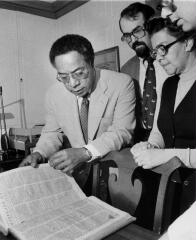Roots
The quest for sources need to illustrate the Roots saga took a number of years. Haley had already found documentation of the ships, including the Lord Ligonier, that had been carrying slaves from the Gambia during the years that Kunte Kinte would have been transported to the United States. In the spring of 1967, Alex Haley arrived in Annapolis searching for confirmation that the slave ship, Lord Ligonier, had docked in Annapolis. Upon his arrival at the old Hall of Records, Haley was directed to Phebe, who carefully listened to his request. He later described their encounter:
During the course of the research, Phebe and Alex Haley became friends. "She would help give a sense of what life for African Americans, free or enslaved, was like during Colonial times in Maryland," recalled Christopher Haley, the late author's nephew. "It just happened that my uncle was someone who hit big with the story that he was researching, but she would help anyone who asked a question."
Phebe received her last letter from Alex Haley in May 1991 and spoke to him only once more before his death the following year. "I think I was very lucky," she remarked to a reporter, "I do think other people in the Hall of Records could have helped him just as well." |
I don't know if people need
genealogical roots, but all people need to belong. -
Phebe I remember it like it was yesterday.... He just went through the roof. He said something like, '"This puts it all together. The circle is rounded."He knew from his grandparents that 'Napolis' was the name of the port where his ancestor came. This would have been proof that his ancestor was here. I remember the Times of London called later and said, "Are you sure he found it?" because they didn't believe it. I said, "Look, I saw it." -
Phebe, recalling the day she found the citation for the
Lord Ligonier My Uncle George always said how Phebe was very special to Uncle Alex. Once you are a celebrity, there's always a sense of "Why is somebody talking to me? Is it because I'm famous?" My Uncle Alex saw in Phebe that she just really wanted to help him. She really had a love for research. For him to have lucked into meeting her was a very fortunate thing for him. -
Christopher Haley She was the one who made the final connection which allowed that story to surge forth. She helped trigger it and also made Alex the father of the popular genealogy movement." -
Leonard Blackshear |
 From
his childhood in Henning, Tennessee, Alex Haley heard his
elders speak of Kunta Kinte, "the African,"
captured by slave hunters and taken across the sea to a
port called "Naplis." After his retirement from
the U.S. Navy in 1959, Haley's began to write articles
that appeared in popular magazines and worked
with Malcolm X to write The Autobiography of Malcolm
X published in 1964. The remembrances of Haley's own
ancestors and their exploits kept intruding, however, and
gave him the impetus to begin documenting the stories he
had heard.
From
his childhood in Henning, Tennessee, Alex Haley heard his
elders speak of Kunta Kinte, "the African,"
captured by slave hunters and taken across the sea to a
port called "Naplis." After his retirement from
the U.S. Navy in 1959, Haley's began to write articles
that appeared in popular magazines and worked
with Malcolm X to write The Autobiography of Malcolm
X published in 1964. The remembrances of Haley's own
ancestors and their exploits kept intruding, however, and
gave him the impetus to begin documenting the stories he
had heard. Haley
remained in contact with Phebe even after his research
was complete, not only keeping her up-to-date on the
status of the publication of the book and subsequent
movie, but keeping up with her own stories of her
research, family, and activities at the Archives. Over
the years, the families exchanged letters and gifts,
including one of Bryce's famed handmade lamps carved from
zebrawood from Africa. In letters to Phebe and in
interviews about the book, he often recounted the story
of the moment that the Roots saga came together, the
reference to the Lord Ligonier in the Maryland Gazette:
Haley
remained in contact with Phebe even after his research
was complete, not only keeping her up-to-date on the
status of the publication of the book and subsequent
movie, but keeping up with her own stories of her
research, family, and activities at the Archives. Over
the years, the families exchanged letters and gifts,
including one of Bryce's famed handmade lamps carved from
zebrawood from Africa. In letters to Phebe and in
interviews about the book, he often recounted the story
of the moment that the Roots saga came together, the
reference to the Lord Ligonier in the Maryland Gazette: